|
|
|
Sort Order |
|
|
|
Items / Page
|
|
|
|
|
|
|
| Srl | Item |
| 1 |
ID:
079043


|
|
|
|
|
| Publication |
2007.
|
| Summary/Abstract |
What are we to make of the neoconservative challenge to traditional international thought? Should we content ourselves, as many have done, to return to classical realism in response? Rather than offer another realist assessment of neoconservative foreign policy this article turns to Hannah Arendt. In a very different language, Arendt articulated a critique of the dangers of moralism in the political realm that avoids realist cynicism. She is also better placed to challenge the neoconservative vision of international affairs, ideological conviction, and their relationship to democratic society. Reading Arendt against Leo Strauss suggests that the fundamental problem with neoconservative ideology concerns its understanding of the place of philosophy in the public realm, the relationship between political thought and practice, ideas and action. She suggests why neoconservatives may be experts at selling wars but seem less adept at winning them
|
|
|
|
|
|
|
|
|
|
|
|
|
|
|
|
| 2 |
ID:
084309


|
|
|
|
|
| Summary/Abstract |
This article evaluates recent literatures within International Relations on so-called 'private force'. It suggests that the conceptual weaknesses of much of this literature can be accounted for, in part, by a misunderstanding of the historical and sociological importance of the way power is organized and legitimated through shifts in the public-private distinction. This distinction is one of the primary mechanisms, if not the primary mechanism, for organizing political, economic and, therefore, military power. For the sake of historical accuracy and conceptual integrity scholars should abandon the terminology of 'public' and 'private' force. Tracing how public-private distinctions shift and change as an effect of political power is a joint task for historical sociology and international political theory
|
|
|
|
|
|
|
|
|
|
|
|
|
|
|
|
| 3 |
ID:
091241
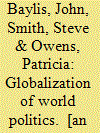

|
|
|
|
|
| Edition |
4th ed
|
| Publication |
Oxford, Oxford University Press, 2008.
|
| Description |
xxxix, 622p.
|
| Standard Number |
9780199297771
|
|
|
|
|
|
|
|
|
|
|
|
Copies: C:1/I:0,R:0,Q:0
Circulation
| Accession# | Call# | Current Location | Status | Policy | Location |
| 054374 | 327.1/BAY 054374 | Main | On Shelf | General | |
|
|
|
|
| 4 |
ID:
113298


|
|
|
|
|
| Publication |
2012.
|
| Summary/Abstract |
As the concept of human security has become part of the mainstream discourse of international politics it should be no surprise that both realist and critical approaches to international theory have found the agenda wanting. This article seeks to go beyond both the realist and biopolitical critiques by situating all three - political realism, biopolitics and human security - within the history and theory of the modern rise of the social realm from late eighteenth and nineteenth century Europe. Human security is the further expansion of social forms of governance under capitalism, more specifically a form of socialpolitik than realpolitik or biopolitics. Drawing on the work of historical sociologist Robert Castel and political theorist Hannah Arendt, the article develops an alternative framework with which to question the extent to which 'life' has become the subject of global intervention through the human security agenda.
|
|
|
|
|
|
|
|
|
|
|
|
|
|
|
|
| 5 |
ID:
082353
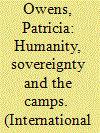

|
|
|
|
|
| Publication |
2008.
|
| Summary/Abstract |
This article responds to the commentary on my book, Between War and Politics: International Relations and the Thought of Hannah Arendt, by Helen M. Kinsella, Richard Beardsworth and Anthony Burke. Burke's claim that Arendt betrays a 'normative defeatism' based solely on his reading of Origins of Totalitarianism is misguided. It is a narrow reading to suggest that Arendt was uninterested in institutions and laws more cosmopolitan in intent than traditional inter-state law. In response to Beardsworth, I argue that Arendt's criticism of the reduction of all politics to violence is not normative in the way he suggests. Nor is it 'merely' to repeat the 'Schmittian/realist argument that conflict is irreducible'. Arendt's agenda is different. Finally, I respond to Kinsella's provocative defence of some concordance (as distinct from equivalence) between the Nazi concentration camps of World War II and US-run camps at Guantanamo Bay, Cuba.
|
|
|
|
|
|
|
|
|
|
|
|
|
|
|
|
| 6 |
ID:
142537
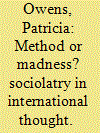

|
|
|
|
|
| Summary/Abstract |
International theory has a social problem. Twenty years after the so-called ‘social turn’, the historical origins of distinctly social forms of thought are not subject to scrutiny, let alone well understood. Indeed, the problem of the ahistorical social is an issue not only for predominant liberal, realist, and constructivist appropriations of social theory, but also the broad spectrum of critical and Marxist modes of theorising. In contrast to practicing sociolatry, the worship of things ‘socio’, this article addresses the historicity of the social as both a mode of thought – primarily in social theories and sociology – against the background of the emergence of the social realm as a concrete historical formation. It highlights problems with the social theoretic underpinnings of liberalism, social constructivism, and Marxism and advances an original claim for why the rise of the social was accompanied by attacks on things understood (often erroneously) as political. To fully understand these phenomena demands a closer examination of the more fundamental governance form the modern social realm was purported to replace, but which it scaled up and transformed.
|
|
|
|
|
|
|
|
|
|
|
|
|
|
|
|
| 7 |
ID:
145971


|
|
|
|
|
| Summary/Abstract |
Economy of Force is not about the ‘economics of war’, or not in any straightforward sense. Rather, it retrieves the older, but surprisingly neglected, history and theory of oikonomia, the ancient Greek term for ‘household governance’. The book is a study of oikonomia in the use of military force, but also as underlying distinctly social forms of governance more broadly. There is a very long tradition of thinking about households-as-government and a great deal of scholarship in literary and gender studies on practices and ideologies of domesticity. Oikonomia is the origin of the language of modern ‘economics’, but more importantly and revealingly almost all writing about government in the West. International and much political theory is out of touch with these literatures, which has resulted in blindness to a crucial reality about modern governance forms. The large-scale household administration of life processes plays a remarkably central role in international and imperial relations.
|
|
|
|
|
|
|
|
|
|
|
|
|
|
|
|
| 8 |
ID:
153670
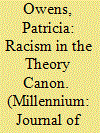

|
|
|
|
|
| Summary/Abstract |
Hannah Arendt’s monumental study The Origins of Totalitarianism, published in 1951, is a founding text in postcolonial studies, locating the seeds of European fascism in the racism of imperial expansion. However, Arendt also harboured deep racial prejudices, especially when writing about people of African descent, which affected core themes in her political thought. The existing secondary literature has diagnosed but not adequately explained Arendt’s failures in this regard. This article shows that Arendt’s anti-black racism is rooted in her consistent refusal to analyse the colonial and imperial origins of racial conflict in the United States given the unique role of the American republic in her vision for a new post-totalitarian politics. In making this argument, the article also contributes to the vexed question of how international theorists should approach important ‘canonical’ thinkers whose writings have been exposed as racist, including methodological strategies for approaching such a body of work, and engages in a form of self-critique for marginalising this problem in earlier writing on Arendt.
|
|
|
|
|
|
|
|
|
|
|
|
|
|
|
|
| 9 |
ID:
093674
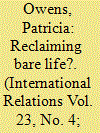

|
|
|
|
|
| Publication |
2009.
|
| Summary/Abstract |
Giorgio Agamben claims that refugees can be seen as the ultimate 'biopolitical' subjects: those who can be regulated and governed at the level of population in a permanent 'state of exception'. Refugees are reduced to 'bare life': humans as animals in nature without political freedom. Contra Agamben, it will be argued here that if refugee populations are not to face some inexorable trend toward a rule of 'exception', then it will not be through reclaiming 'bare life'. It will be wholly dependent on the ability to forge a public realm grounded on the appropriate distinction between nature and political artifice, between human life and the political world. This argument is made through contrasting Agamben's writing on refugees with Hannah Arendt's. What is at stake in the difference is illustrated through the example of refugee lip-sewing.
|
|
|
|
|
|
|
|
|
|
|
|
|
|
|
|
| 10 |
ID:
100316
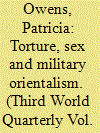

|
|
|
|
|
| Publication |
2010.
|
| Summary/Abstract |
This article revisits the debate about recent American torture practices, particularly the use of discredited anthropological texts to validate long-held Orientalist assumptions about the sexual vulnerability of Muslim males. Such practices are placed in an historical context of older imperial constructions of sexually deviant Muslims as well as of more general forms of gendered and sexual subordination required for war. American torturers intended to produce very particular objects of torture-ones willing and able to confess their 'true' orientation in terms of a binary hetero/homo sexual code established in 19th-century Europe. The torturers had the power to confirm through confession and re-enactment their crude assumptions, irrespective of the actual sexualities of those being tortured, with consequences for the transnational and reactionary politics of sexual identity.
|
|
|
|
|
|
|
|
|
|
|
|
|
|
|
|
| 11 |
ID:
161422


|
|
|
|
|
| Summary/Abstract |
Existing surveys and anthologies wrongly convey the impression that women in the past did not think seriously about international politics. This article provides evidence of the magnitude of the exclusion of historical women from the field by analyzing sixty texts in the history of international thought and disciplinary history. It also begins the process of remedying this exclusion. I map a new agenda for research on the history of women's international thought. Work in feminist historiography, as well as new archival research, suggests that a diverse array of historical women thought deeply about international relations, but their intellectual contributions have been obscured—and even actively erased. To illustrate what international studies can gain by pursuing a research agenda on historical women's international thought, I discuss a neglected, but at the time extremely important figure, in what might be called “white women's international relations,” the influential scholar of colonial administration, Lucy Philip Mair.
|
|
|
|
|
|
|
|
|
|
|
|
|
|
|
|
| 12 |
ID:
178986
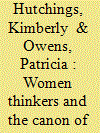

|
|
|
|
|
| Summary/Abstract |
Canons of intellectual “greats” anchor the history and scope of academic disciplines. Within international relations (IR), such a canon emerged in the mid-twentieth century and is almost entirely male. Why are women thinkers absent from IR’s canon? We show that it is not due to a lack of international thought, or that this thought fell outside established IR theories. Rather it is due to the gendered and racialized selection and reception of work that is deemed to be canonical. In contrast, we show what can be gained by reclaiming women’s international thought through analyses of three intellectuals whose work was authoritative and influential in its own time or today. Our findings question several of the basic premises underpinning IR’s existing canon and suggest the need for a new research agenda on women international thinkers as part of a fundamental rethinking of the history and scope of the discipline.
|
|
|
|
|
|
|
|
|
|
|
|
|
|
|
|
|
|
|
|
|